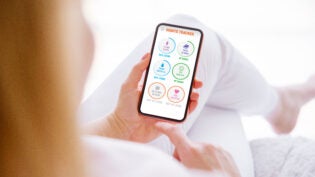
Being mindful of your body, mind and feelings in the current moment is referred to as mindfulness. It can be fostered through the use of methods such as meditation, focused workouts and “single-tasking.” Employees who work for organizations that foster mindful thinking experience less emotional tiredness, more job satisfaction and greater overall performance.
Mindfulness is increasingly being used by executives and professionals to manage stress, improve cognitive performance, boost emotional intelligence, retain strategic focus and strengthen interpersonal relationships.
Zaeem Chaudhary, Founder of AC Design Solutions, states “As a founder of AC design solutions, I’ve discovered that mindfulness is a vital component of success. I make active awareness a part of my everyday routine and encourage my coworkers to do the same. Managers who want to achieve their full potential at work and support their workers to flourish should consider the following tips for workplace mindfulness.”
Learn How to Single-Task
Take one task at a time and write it down on a to-do list. Setting work intervals is an excellent place to begin, but it’s not an easy task. For example, the Pomodoro Technique is a time management technique that splits work into 25-minute periods of intense attention followed by short breaks. A few minutes of meditation just before changing gears can help you stay focused when your priorities or activities vary. To clear your thoughts and shift to the next task, count your breaths, close your eyes, or use an app like Headspace.
According to Sarah Jameson, Marketing Director of Green Building Elements, “Focusing on one task at a time instead of multitasking is an underrated mindful practice that effectively helps in hectic and high-pressure business days. Contrary to popular belief, multitasking is counterproductive. It is a disruptive practice that rarely gets things done and when it does, it usually yields haphazard results.
Take a Moment to Relax
Taking a few moments to relax and let your mind wander, free of distractions, allows you to absorb new information more quickly and opens up channels for creativity. So don’t be scared to take a break from time to time! Making break-taking a cultural imperative and proposing that employees block aside time to participate in mindfulness exercises — whether that’s walking around the block or taking a few minutes to listen closely to the noises around you — can help get employees’ creative juices flowing.
Adam Wood, Co-Founder at RevenueGeeks, says “My best tip on approaching difficult business times with mindfulness is to incorporate mindfulness breaks into your day, such as after you wake up, before work, before and after a particularly stressful meeting, and on the way home from the office. It can be hard to do when you feel guilty about taking a break when you feel the weight of the business on your shoulders. However, these breaks are incredibly important to help you relax, stay focused, and have a clearer mind to face the challenges.”
Embrace the Listening Art
Hearing is natural, but listening takes practice. My company believes in generating immersive listening experiences through our high-quality speakers and headphones, as well as in everyday encounters. We recently launched the “How to Listen” initiative, which is helping our staff feel better and be more productive. These practices help them connect with our audiences while also allowing them to tune in to their own feelings.
Tyson Stevens, Founder of EduRef, encourages practicing active listening. He believes “when people talk, they spend the majority of their time in their brain, contemplating their response.” He further added “We tune out approximately halfway through the person’s thoughts. When you’re next in a conversation, consider active listening, which involves focusing your entire attention on the other person. Utilize your ears, heart, and intuition to listen. Conduct mindful listening exercises and note whether the quality of your talks improves.”
Become Comfortable With Uncertainty
Understand how to pivot fast and effectively. The most accomplished CEOs are able to quickly adjust to new settings in which change is the only constant. Introduce yourself to a variety of learning methods in order to boost your adaptability and performance. Mindfulness training can help you deal with whatever is going on in the moment rather than going into autopilot mode.
Daniel Carter, CMO at Scooter Guide, suggests “Don’t be afraid of letting your mind wander in its train of thoughts. This practice is common and necessary to help you refocus and approach any difficulty in front of you with more thoughtful solutions. Get used to regular practices of mindfulness to keep your brain focused and on schedule. Practice letting go of some of your thoughts and having a free mind. Generally, don’t get discouraged or be too hard on yourself in case of any difficulties.”
Set a Good Example
I’ve been incorporating even more mindfulness-based practices and choices into my daily activities. I’m more aware of what I’m eating, and instead of speeding through a workout, I try to stay focused and in control of the moment. I am a regular yoga and meditation practitioner. Meditation gives me more strength and vitality, as well as opens my mind to the insights and breakthroughs I’ve been looking for (sometimes creative, sometimes analytical).
According to Anjelica Rivera, CMO at Cell Tracking Apps, “Reflecting and meditation can help an employee find purpose and direction within the company’s structure.” She further added, “These small things are not impactful in the grander scheme of things, but added together, they can bring about change that benefits the company over the long term.”
Practice More Gratitude
I’d make awful business decisions if I didn’t practice mindfulness. When my brain is not in the present moment, I notice that I begin to think about everything that is on my mind, which is really overwhelming at the time. Being attentive allows me to focus primarily on the present moment, rather than worrying about the future or the past. It has helped me in being more grateful for what I have now because of mindfulness.
Bradley Bonnen, Founder & CEO at iFlooded Restoration, believes “One way that I approach difficult business times with mindfulness is by practicing gratitude.” It can be easy to focus on the negative, but taking a few moments to slow down and focus on the positive is game-changing. A gratitude practice in a workplace can have a major positive impact. Managers who remember to say “thank you” to people who work for them may find that those employees feel motivated to work harder.
Encourage “Monotasking”
Organizations usually use the phrase “excellent multitasker” in job advertising and then praise multitasking as a virtue. Those who are seen doing a lot of tasks at once are rewarded, and everyone else is expected to follow suit. But, there’s a catch: There is no such thing as multitasking; only task hopping exists. Furthermore, task hopping diverts attention from both awareness and productivity.
Switching from one task to another does not happen automatically; rather, it takes time to retrain one’s thinking and enter into a new routine. Sometimes task hopping is unavoidable, but if it continues, the quality of everything you do will suffer significantly. Instead, focus on one activity at a time.
According to Danny Trichter, Founder of Accessibility Checker, “Monotasking is the purposeful attempt to focus on a single task and devote as much attention to it as possible until it is completed. It entails focusing on a particular task rather than attempting to complete everything at once. The practice leads to better work and, contrary to popular belief, increased productivity.”
Awareness
A mindful leader must learn to be more aware of themselves and their surroundings. You will be able to reflect on your own thoughts, behaviors, decisions and ideas if you are more self-aware. You are also affected by a poor day at work, just like your employees. It’s critical to take care of yourself first in order to properly lead your team. As a result, make sure you detect the signals of needing a break, stress, or anything else that may be affecting your health.
Greg Rozdeba, President of Dundas Life, suggests looking for symptoms of burnout, disengagement, or a problem in any member of your team can be referred to as being aware of your surroundings.” He further suggests, “Inquire, have a one-on-one chat, listen, and propose the best course of action.”
Mark Valderrama, CEO & Founder of Aquarium Store Depot, says “Everyone is different when it comes to mental health. It’s important to know yourself and to practice self-care so you can manage your mental health. Exercise, eating a healthy diet, and connecting with people digitally are all important for keeping yourself mentally healthy.”
Keep Things Simple and Enjoyable
Practicing mindfulness does not necessitate extensive prior knowledge, equipment, or the use of an app. All you need for your everyday practice is a peaceful and comfortable location. Consider meditating first thing in the morning, before the day’s emotions and distractions begin to surface. Before you get breakfast and start about your day, sit with your thoughts for a few minutes.
Aziz Ash, Head of Marketing at RewaaTech, believes “You can practice mindfulness at any time during the day. During regular tasks such as taking a shower, eating a meal, or going on a stroll, try to be more present and in the moment. Mindfulness in small doses throughout the day adds up.”
You will not only boost your ability to influence the world if you use these three mindfulness practices. You’ll also be a role model for your entire workplace: the deep and linked relationship between personal well-being and building a tremendously successful company.
2471 Views














